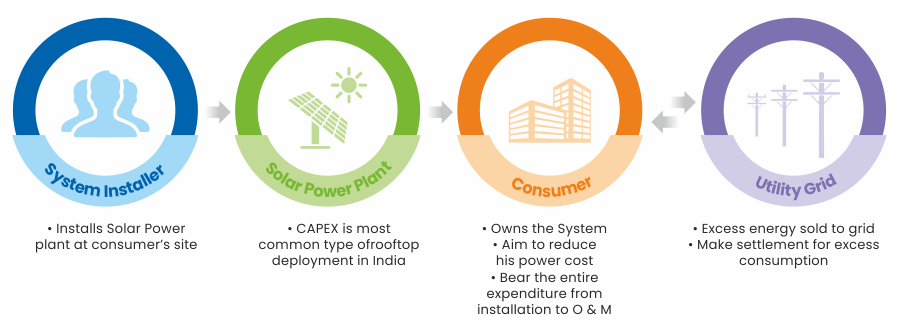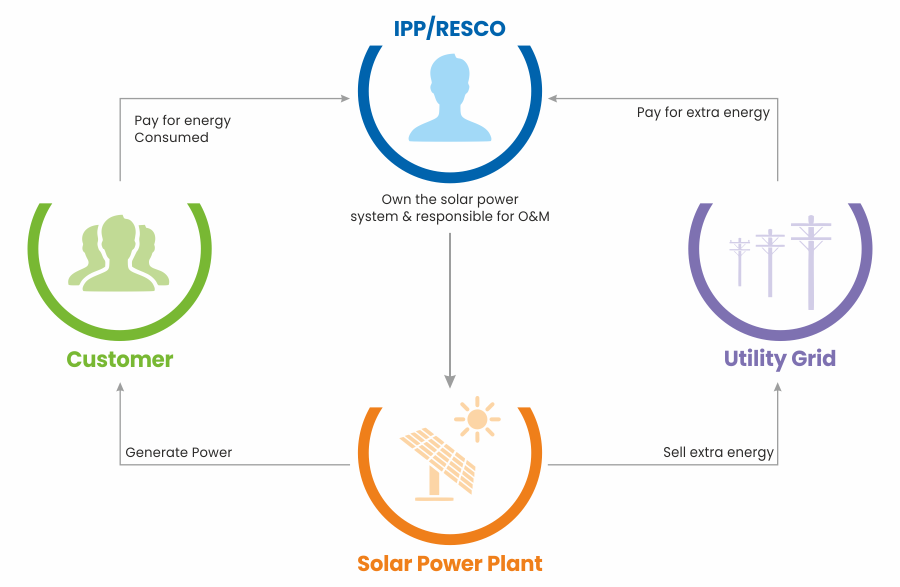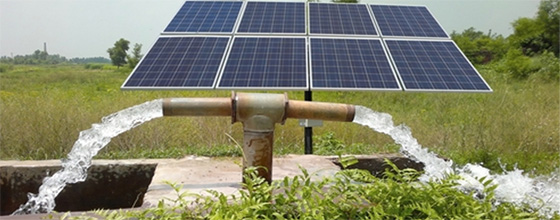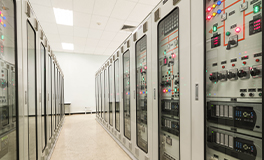While looking to purchase renewable power, the biggest challenge companies face is financing. Solar power plants need high upfront expenditure, which in the absence of government incentives and subsidies may deter interest from those who may find the process expensive and time-consuming. Large industrial units face the prospect of fulfilling their renewable energy obligations or be penalized with heft energy bills or sanctions. In this blog, we will discuss about the options available for investing in solar power in India.
The investment options available can be broadly classified as:
- CAPITAL EXPENDITURE (CapEx)
- OPERATIONAL EXPENDITURE (OpEx)
Both CapEx and OpEx models need to be considered while evaluating the financial viability and long-term profitability of a solar power plant.The decision depends on various factors specific to a company’s objectives and financial considerations. Let’s explore the characteristics and benefits of each model to help you make an informed decision.
Capital Expenditure (CapEx) Model for Solar Power Plants
Capital Expenditure or CapEx refers to the initial investment required to establish the solar power plant. It includes the costs associated with acquiring and installing the necessary equipment, such as solar panels, inverters, mounting structures, electrical infrastructure, and other components. CapEx also covers the expenses related to land acquisition, engineering, procurement, construction, and commissioning of the plant. Essentially, CapEx represents the upfront capital investment required for the infrastructure and assets of the solar power plant.

In a CapEx model, the company invests in acquiring assets or infrastructure upfront, which are expected to provide long-term value. Once the plant is operational, the owner assumes responsibility for its maintenance and operational costs. The revenue generated from the sale of electricity produced by the plant is taken by the owner of the plant.
In this model, the owner has full control over the plant and takes ownership of the financial rewards as well as risks associated with the solar plant.
Advantages
- Ownership: The company owns the solar power plant and can leverage them over an extended period. Owning the solar power plant provides control over its operations and potential revenue streams.
- Depreciation and Tax Benefits: Capital expenditures can often be depreciated over time, and are eligible for tax incentives or credits.
- Cost Savings over time: Solar plants provide long term benefits in energy costs, also helping fulfill long term green energy obligations, if applicable. Owning a solar power plant saves recurring lease or subscription payments.
- Control: Owning the assets allows for greater control over maintenance, upgrades, and customization.
Disadvantages
- Capital requirements: Purchasing a solar plant may require a significant upfront investment, which could strain financial resources.
- Maintenance and Repairs: The company would be responsible for the ongoing maintenance and repairs of the solar power plant, which is a tedious task that requires expertise.
Operational Expenditure (OpEx) Model for Solar Power Plants
Operational Expenditure or OpEx refers to the ongoing operational expenses involved in running and maintaining the solar power plant throughout its operational lifetime. It includes costs related to regular operations, such as labor wages, maintenance and repairs, monitoring systems, insurance, taxes, administrative expenses, and other day-to-day operational costs. OpEx is typically incurred on an annual basis and represents the expenses required to ensure the smooth functioning and performance of the solar power plant.

In an OpEx model, the company enters into a contract or agreement with a solar provider who owns and operates the plant, rather than making significant upfront investments. The emphasis is on outsourcing the development, operation and maintenance of the solar to an Independent Power Producer (IPP). The IPP enters into a power purchase agreement (PPA) with the owner of a commercial or industrial entity, agreeing to purchase the electricity at an agreed-upon rate. The power purchaser thereby benefits from predictable electricity costs.
Advantages
- Flexibility: OpEx expenses can be more easily adjusted based on business needs, allowing for scalability and agility.
- Predictable costs: In OpEx model long term power purchase agreement(PPA) allows the buyer to have predictable and stable electricity costs making financial planning and budgeting more straightforward.
- Performance and Risk Guarantees: Under Power Purchase Agreements, IPP’s commit specified performance targets ensuring minimum energy production and system uptime, failing which IPP may attract financial penalties. This provides an added layer of assurance to the the buyer by mitigating performance related risks.
- Access to Expertise: IPP are experienced power producers who leverage their industry expertise and economies of scale to optimize plant performance, improve efficiency and ensure regulatory compliance.
Disadvantages
- Long-term costs: Over an extended period, OpEx expenses can surpass the upfront costs associated with a CapEx model. While OpEx model provides predictable energy costs, it may be higher in the long term as compared to CapEx model.
- Dependency: The IPP is responsible for operations, maintenance and performance of the solar power plant. The effectiveness of arrangement thereby depends on the capabilities and reliability of the IPP, in the long run
Conclusion
As we can see both the models have their advantages and disadvantages. The CapEx model provides direct control and potential long-term gains for the owner, while the OpEx model offers hassle-free approach with reduced upfront costs and predictable prices. The choice between the two models depends on the factors such as power purchasers financial capabilities, appetite for risk, operational expertise and long-term objectives.
About LUBI Electronics
LUBI Electronics is a leading company in India, exhibiting expertise in the automation, solar, and control panel industry.
Our solar offerings include best-in-class solar modules, solar pumps, solar pump controllers and solar inverters.
For more information on our offerings, please reach out to us at lubi@lubielectronics.com.












